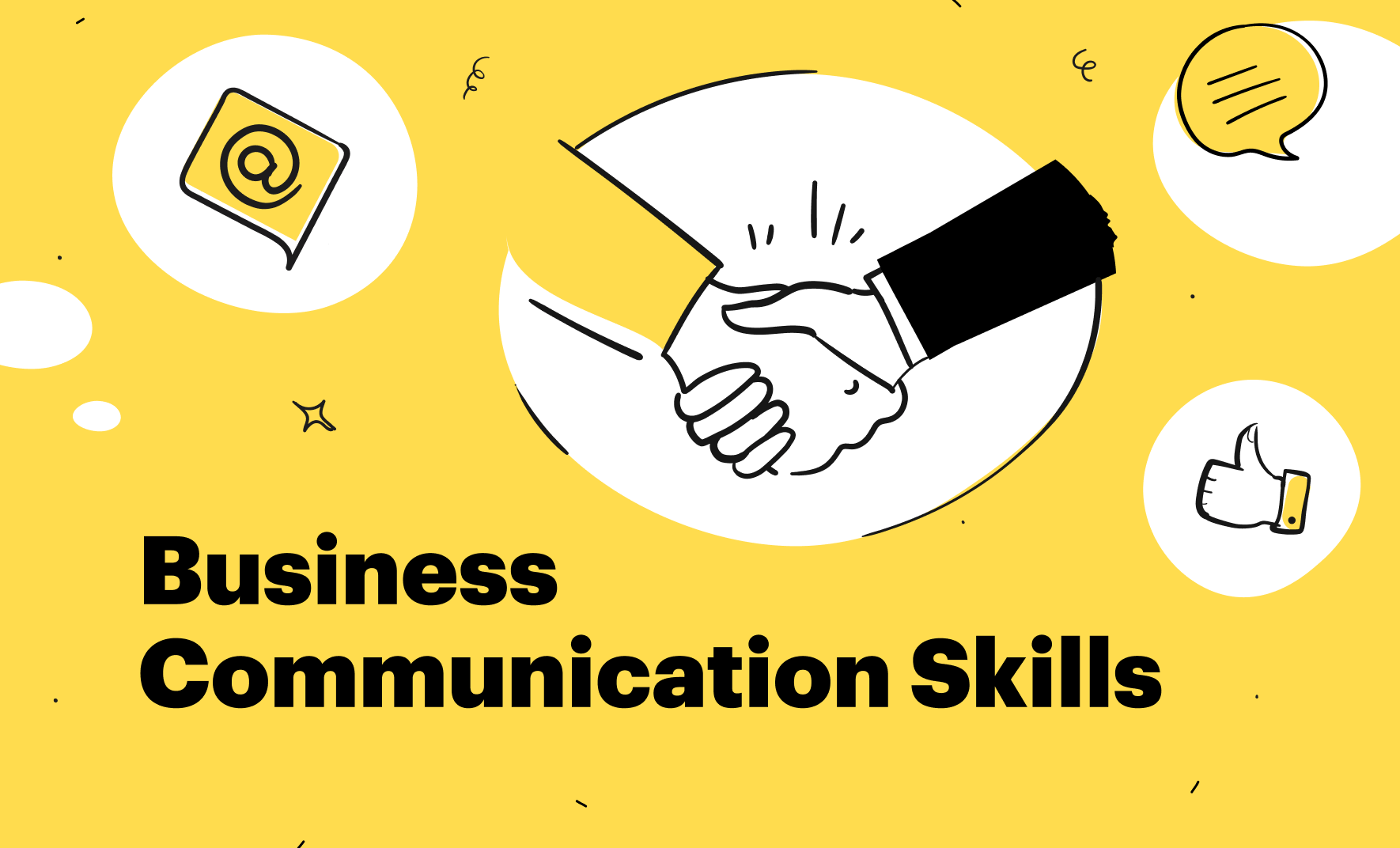13 Must-Have Business Communication Skills [Guide and Tips]

Business Communication Skills are the skills you use to pass information to people linked to your business. It could be colleagues, team members, employees, or senior managers or it could be clients. These business communication skills are a vital part of any business, no business will succeed as a one-man band, so communication is essential. In the tech industry communication skills are sometimes undervalued at the expense of technical knowledge and ability and whilst these are indeed necessary, without the communication skills to run alongside this, you will have problems.
And good communication skills are not just important for business leaders, interpersonal relationships oil the wheels all through your business at every level. It’s what business leaders want from their staff, it’s what senior management wants from their rising stars, it’s what clients want from their service providers, so why is it so often forgotten or pushed into the background. With the tech world becoming more isolated and remote, good business communication skills are more important than ever before.
1. Verbal Business Communication Skills

Much of your time at work, even today will be spent using your verbal skills. Probably you don’t even consider it a skill, after all, you’ve been doing it all your life and people understand you. It’s a fair point. But it’s number one on this list for a reason. The way you communicate your ideas and thoughts, the way you use language to engage and interest, capture the attention, and hold it, is the most neglected area of communication. You’ll spend time learning to write and structure writing, but how often does that happen to your speaking. Maybe, when you are actually reading a speech or giving a presentation but here we are talking about your everyday communication.
In business more than any other aspect of your life, your verbal communication needs to be clear, concise, and specifically tailored for the purpose or situation you find yourself in. Your verbal communication needs to be organized and take into account the audience. You know when it’s done well, and you know when it’s done badly – but do you really think about why it was good to bad. There are talented speakers that can hold you from the off, there are others you can barely concentrate on for a few seconds. Watch the news – it’s right in front of you, but look at how they best do it and what techniques do they use.
Not every conversation is going to be of great importance but many will be, probably more than you think. How you speak is not only about the information you communicate but the image you present.
How to improve your verbal communication skills:
- Plan: figure out all the points you need to make in advance.
- Organize: work out the priority of information, start with the most important.
- Know your audience: think of the language they feel most comfortable with, and what they need to hear.
- Practice: don’t communicate cold, like everything practice will help you improve. Go over what you want to say in your head, in front of a mirror, in front of the dog, listen to yourself -be honest how do you sound.
- Reflect: take some time to think about what went well and badly and why, and how can you work on them.
2. Non-Verbal Business Communication Skills

Non-verbal goes hand in hand with verbal, some would suggest it’s more important. Done well it can present a confident air of authority, it can generate understanding and empathy, it can reinforce your message, and make the listener feel at ease. Done badly, you can lose any power the words have.
Non-verbal is obviously an enormous part of face-to-face communication and is not important in written communication but don’t be fooled into thinking that the less face-to-face you have the less important it is. You will meet people in business, even if it’s not as frequent, and you will also have video meetings. It could be argued that in a video meeting when the focus is on you through the screen non-verbal is even more obvious than face-to-face. The camera shows all, as it were.
And of course, you need to recognize the nonverbal signs of others. They should influence your own communication.
-
Facial Expressions
Your facial expression tells the story, often before you actually start to speak. In an online video meeting, your face is very much the center of attention. Work on it, smiling will make people feel comfortable, relaxed, and open but you can’t be expected to converse all the time with a Cheshire cat grin.
-
Body Movement
Things like sitting up or standing straight, eye contact, appropriate arm, and hand movements portray your feelings. Confident or nervous people pick up on them often subconsciously. Body movements also show you are paying attention to others, listening, nodding, and raising your eyebrows. Even in video meetings you should try to be animated, and natural as if you were meeting face-to-face. And remember those habits- finger tapping, rolling your eyes, touching your nose, and flicking your hair are all doubly noticeable when the camera is pointed at you.
-
Voice
“It ain’t what you say, it’s the way that you say it.” well maybe that’s not 100% true but there is a valid point. Volume and tone express feelings.
-
Physical Boundaries
What is a comfortable distance when speaking face-to-face? it very much depends on the relationship, situation, and even cultural differences. Be sure to look up the norms and expectations before going on your international business trip. In the office, you need to be aware of how people feel if you get too close, especially but not exclusive to gender differences. Even in online meetings, don’t get too close to the camera.
How to improve your non-verbal communication skills:
- Be aware
- Check cultural differences
- Record yourself in a video meeting and watch it back – you’ll see what others see
3. Active Listening

A mighty important area of communication is knowing that it is a two-way street. Listening is as important as being listened to, in the long term. If you listen and more important show that you are listening, then you are demonstrating that you are prepared for other opinions, open-minded, democratic, and confident enough to let others have input. The more you show you are listening the more others will give- and more often than not they give constructive valuable opinions.
Being an active listener means utilizing your non-verbal communication, nodding, eye contact, expressions, etc., and your verbal skills. Summarising their position, paraphrasing, repetition, asking questions, feeding on what they’ve said, and developing it. It also means acting on their ideas and input if you think it’s appropriate. And remember this isn’t an act -people can see through the pretense in an instant.
In the IT industry, this is particularly important as you are often surrounded by specialists in certain areas and you want as much valuable input as possible. If you want your team to feel valued, take responsibility, and be active then being a genuine active listener is essential. If you are dealing with a client being an active listener means you can get the most out of them so know exactly what they mean and can avoid costly misunderstandings.
How to improve your active listening:
- Practice listening without speaking
- Focus on the speaker
- Remind yourself of the good habits
4. Interpersonal Skills

Interpersonal skills are the bedrock of trusting and strong relationships in the business environment, taking the working relationship to a deeper level. These are the skills and emotional intelligence that help your rate and form relationships with your colleagues and long-term clients. The better you know someone you are working with the tighter your bond, the stronger the team, and the more collaborative the workforce. Interpersonal relationships are based on understanding and empathy, tolerance and acceptance, and attention to others’ feelings. It can and does happen naturally in many cases but there has to be an active approach, especially by leaders and managers.
Can you look at something from another point of view? From a social point of view, do you handle every same situation the same way regardless of the colleague or do you try to take into account individual differences? From a business point of view, can you understand a client’s concerns about a project? Can you place yourself in their position? Can you explain the situation in a way that the given person will fully understand without patronizing? These are real skills, they require thought rather than training, and empathy rather than empirical learning but they will make a difference to your team and to your clients.
How to improve your interpersonal skills:
- Don’t disregard the obvious
- Don’t assume, ask.
- Work on your skills
- Don’t forget what got you there in the first place
5. Politeness

“Manners maketh the man” politeness has a purpose, it is nice but it is more than being nice. Politeness creates an atmosphere of respect, where good manners are an essential part of the process, not an added bonus. Manners and respect hold teams together, make interaction and interpersonal relationships pleasurable and improve the overall ethos of the business. Politeness is to the fore, whether it’s face-to-face, written, or online. It is as important to be polite to your colleagues as it is to your clients. Respect is for everyone, don’t pick and choose.
How to improve your politeness:
- Treat everybody as you want to be treated
- Notice how people respond to politeness
- Be overly polite rather than under polite
6. Written Business Communication Skills

Photography by Donatello Trisolino
Written communication be it in email or messages is a vital skill. Brief, well-organized, audience-driven, articulate, and accurate. How you write speaks volumes about how you communicate but also your values. Poorly written and error-ridden says more about you than just your communication of information. If you don’t check through your writing, you come across as careless, if the details don’t matter in the writing, why should they matter in the work. But you can work on your writing skills, there are courses, there is advice, there are examples – use them.
How to improve your writing:
- Read – look at how others write to you, note you think is good, and bad
- Learn- use the resources and help available
- Check everything, (twice)
7. Presentation Skills

Presentation skills are not solely about your PowerPoints or Google slides but the skills that you show during those performances are skills that you should be demonstrating throughout your working day. Presenting is about communicating, whether you are communicating your ideas to a group in a formal situation or informally explaining something to an individual, the essence is the same. You need to get the attention, be engaging, organized, informative, and try to influence. You work on a take time over your presentation skills for a managed event so used the same tactics on a daily basis. Treat each interaction as a mini-presentation, define your aim and goal, and work towards that outcome. It doesn’t have to be task-driven, it could as easily be to make someone feel more comfortable in your presence, to encourage, even just to show you are human.
How to improve your presentation skills:
- Treat your daily interactions as mini-presentations
- Work towards desired outcomes
8. Communication Skills in Teamwork

If you are a member of a team or a team leader, the most valuable skill is realizing the importance of the team. “No man is an island.” At some point in your business working day, you are going to have to work with others. How effectively you do this will have a major impact on your business outcomes. Teamwork is about recognizing the different skills and abilities in the group and working towards a common goal. It is also about realizing that people work in different ways and are treated as individuals within the group. For this to happen communication needs to be clear and effective, know your role and play that role.
How to improve your teamwork communication:
- Assign roles (perhaps informally)
- Get to know your team
- Follow the team philosophy
9. Communication Skills in Sales

Even if you are not directly in the sales department or a salesperson you are selling something. Salespeople have the training, courses, qualifications it is more natural for some than others. Your selling skills may not necessarily be linked with selling a product, more likely you are selling ideas, selling yourself, selling your decisions, selling the best course of action, selling the team..but selling nevertheless.
Selling is persuading, inspiring, and leading. Roles you are familiar with. Look at what the salespeople do, look at how the best ones do it. A calm, confidence, a plan of attack, plenty of positive nonverbal communication, a pitch..these things are not left to chance they are planned and practiced.
How to improve your salesman skills:
- Watch the professionals and learn from them
- Do your research, know your product, know what you are selling
10. Negotiation Skills

Just like you sell but are necessarily a salesperson, you negotiate throughout your daily routine without necessarily knowing it. Negotiation is about coming to a mutually beneficial solution. you do it with your colleagues, your team, your clients, and even with your own family. It is how life works. But negotiation is a skill, how much can you give and still win, how much can you push without a backlash or breakdown of communication. Successful negotiators know what they have to offer and know what the other side needs and wants. This is a skill and it is not a skill that you want to brag about. The best negotiators are the ones with whom you don’t even realize you’ve been in negotiation.
How to improve your negotiation skills:
- Aim for a win-win, not a win. Mutually beneficial arrangements are best for long-term success
- Know your own position and know your limitations
- Set your boundaries
11. Networking

Networking is not far removed from interpersonal skills. The idea is to become known and to get to know. It’s usually used in association with business conferences and social events but at its most basic level, it is just as important to network with your colleague as your potential clients, with your team as with team leaders, with employees as with ex-presidents. Networking is about putting yourself out there and actively building strong relationships. Try to be natural, don’t automatically try and work every room, it looks obvious and desperate. And give people time, people prefer to talk rather than listen, practice those active listening skills.
How to improve your networking:
- Be natural
- Give people time
- Active listening is a must.
12. Never Stop Learning

You do not know everything!
The idea of lifelong learning is the constant pursuit of knowledge for either personal or professional reasons and for constant growth. In the case of business communication, there is a vast interconnectedness. This doesn’t have to be about going on new courses or learning to bake bread. (although neither are bad ideas) What we are talking about is learning from those around you, watching, reflecting, picking pointers, not being afraid to ask questions, not being afraid to listen to answers, and realizing that the input of others will make you stronger.
In the tech industry, probably more than any other, things move quickly. You can not be an expert on everything, and neither should you try to be. A good leader will be open to others, will collect information from different sources, will listen and act on advice, and will give responsibility and freedom to their staff. A good team colleague will ask for and offer advice, this is the fundamental nature of collaboration. The tech industry has specialists so you don’t need to be one.
How to get into the Socrates mindset:
- Realize you don’t and can’t know everything
- Look at actively improving key areas
- Take best practices from others
- Ask questions
- Be open to advice and suggestion
- Be honest – if you don’t know, say so. But find out for next time.
13. Stay Enthusiastic

A positive attitude goes a long way in business communication. If you are a leader you set the tone, if you are a team member you add to the tone. Enthusiasm is catching, it filters through an organization – as does a stress-out, negative attitude, or mood. Be very aware of the signals that you are giving out, people notice. Keep smiling, look for positives, keep a lid on your temper, take time out, rationalize, and always look at the bigger picture.
How to keep your enthusiastic vibe:
- Be aware of the signals you are giving out -they affect everyone
- Take time out if you are angry
- Never speak or write in anger
Business Communication Skills Can Make Your Business Special
Many of the business communication skills here are frightening obvious, they are natural and your passage through life has established them as habits and rituals. This breakdown is a reminder of these skills, sometimes we forget the obvious, we neglect what seems easy, and look for magic formulas of success. Success is based on communication combining these skills makes you a great communicator rather than a practical communicator. Like any in business, these skills do not work well alone, interconnectedness is essential. Great verbal skills without nonverbal won’t get you far, and super nonverbal without verbal will be just weird. Of course, you know these things – but be aware, reflect, and work on them. Like all skills, they get better with practice.
In the meantime, why not continue with some of the related articles on communication: